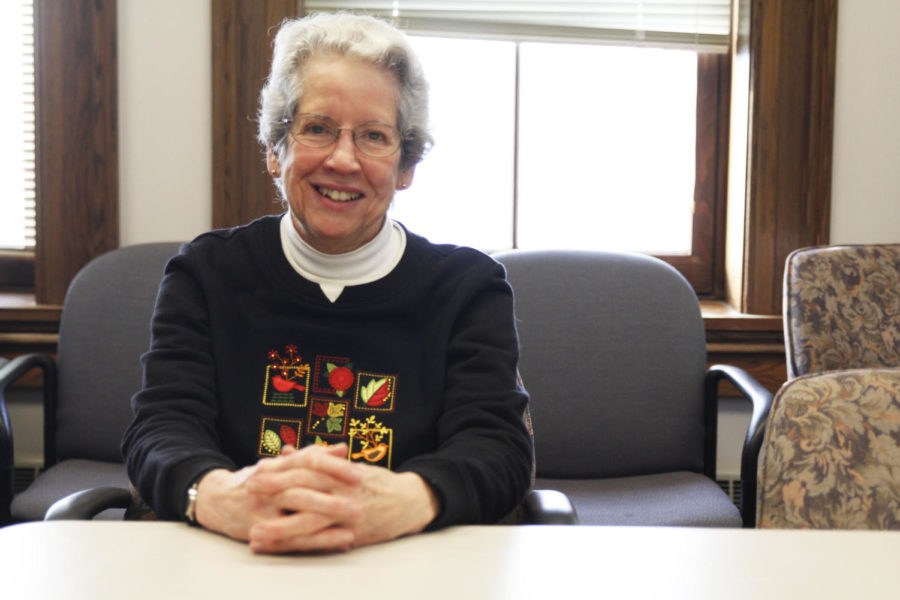Nun and atheist professors celebrate friendship
Katlyn Campbell/Iowa State Daily
Dr. Anne Clifford, Monsignor James A. Supple Chair of Catholic Studies.
February 20, 2019
Professor Anne Clifford spent the last 11 years teaching religion and ecology at Iowa State. She has given lectures on a multitude of topics, including racism and immigration. During her tenure, she also found an unlikely friend: The avowed atheist professor Hector Avalos.
Clifford occupies the James A. Supple Chair of Catholic Studies at Iowa State. She’s had a life-long love for education and the sciences, and she’s also a Catholic nun, one of the only members of her congregation in Iowa.
Avalos, author of books like “The Bad Jesus” and “End of Biblical Studies,” has been described by different Christians as an evil, incredulous and corrupting force at Iowa State. The Des Moines area radio host J. Michael “Mac” McKoy even wished for the professor to choke on his Thanksgiving dinner.
“I think [Avalos] is the devil incarnate,” McKoy said on his program “Mac’s World” in November 2015. “I’m going to wish for bad things to happen to him.”
Clifford doesn’t share McKoy’s perspective when it comes to her colleague. As a sister of Saint Joseph, she promised to “love the dear neighbour without distinction,” and she continues to uphold that principle.
“[Avalos] is a consummate gentleman and a hardworking scholar,” Clifford said. “He’s always been respectful and kind to me. I’ve always tried to look for the good in people, and I find a lot of good in Hector Avalos.”
Clifford even nominated Avalos for the 2016 Iowa Regents Honors Award For Faculty Excellence, which he won. The Iowa Board of Regents award this honor to just a handful of professors each year from the major universities.
The process takes a lot of work, and requires multiple signatures and evidence-based arguments in favor of the nominee. Clifford wrote a letter to the Regents, as the process dictates, and shared with them why Avalos deserved the award.
Clifford and Avalos also bonded over their shared love for higher education.
“She and I come from an older tradition,” Avalos said. “We tend to have similar views on many important things in the department, like curriculum, hiring and promotions.”
Clifford and Avalos share the common belief that religions like Christianity should be open to criticism.
“We’re on opposite sides of the moon when it comes to certain things around Christianity, but I feel that it’s wrong to not accept carefully researched criticisms,” Clifford said. “Critiques can bring people to have new insights that further growth. It’s not a bad thing, it’s what scholars are supposed to do.”
Clifford describes herself as a “non-literalist” when it comes to analyzing scripture. She said she views the Bible as more of a historical document, one that describes people interacting with a deity.
“The ancient world often spoke of the world in terms of symbols,” Clifford said. “Symbols give rise to thought, but where do these thoughts lead you? That’s what we explore in some of my classes. I don’t think the Bible should be read literally.”
Clifford teaches courses about feminism, Christianity and ecology and how they all can intersect. Her book, “Introducing Feminist Theology,” is used in theology and women’s studies classes in colleges across the country.
“I always had a love for science,” Clifford said. “I remember reading through books and encyclopedias when I was in the second grade and trying to memorize things like the order of the planets. I was the only girl in the county to get the insect badge in Girl Scouts.”
Clifford realized teaching was her true calling around age 12, when she began tutoring her younger sister in school. She enjoyed it so much she began tutoring other school children in the neighborhood, and would pursue teaching as a career.
She joined the Sisters of Saint Joseph right after graduating high school and obtained her master’s degree from the Catholic Theological Union in Chicago.
Clifford went on to teach in a variety of positions in Pennsylvania, including lecturing at a few small colleges and teaching 6-10th-grade children at Mount Gallitzin Academy for nearly a decade.
She eventually earned her doctorate in theological studies from the Catholic University of America.
“You can’t get much more Catholic than that,” Clifford said.
Clifford then taught for 20 years at Duquesne University in Pittsburgh. Afterwards, she taught one year at John Carroll University before applying for a position at Iowa State. She has been here ever since.
Avalos was part of the staff that interviewed and hired Clifford 11 years ago.
“Our friendship illustrates that Christians and atheists can and do work together,” Avalos said. “We cans still solve problems together, and whether or not you believe in a creator is irrelevant.”
This semester will be the last she ever teaches, and she will retire once the term ends.
Clifford is a Sister of Saint Joseph, a congregation with a history of providing education and social services. They were among the first nuns to not be “cloistered,” meaning they weren’t secluded to their convents.
Moving to Iowa State isolated Clifford from her fellow sisters, and forced her to keep up with them mostly through web chats.
“I’m more of an introvert by nature, so it doesn’t really bother me,” Clifford said. “But I try to spend close to a month each summer with them at the convent.”
After retiring, Clifford will live among her friends and sisters at a Saint Joseph’s property just northwest of Pittsburgh. Although it feels like the right time for her to retire, she said she’ll still miss being an educator.
“I love teaching undergraduates,” Clifford said. “I absolutely love it. I love preparing the presentations and engaging the students. I’m also going to miss the Iowa people and all my friends in the faculty.”

















